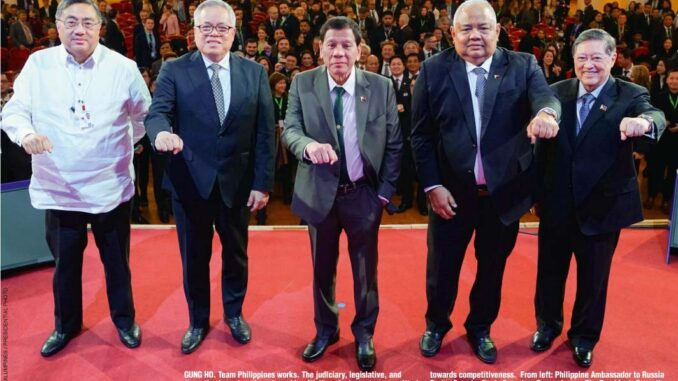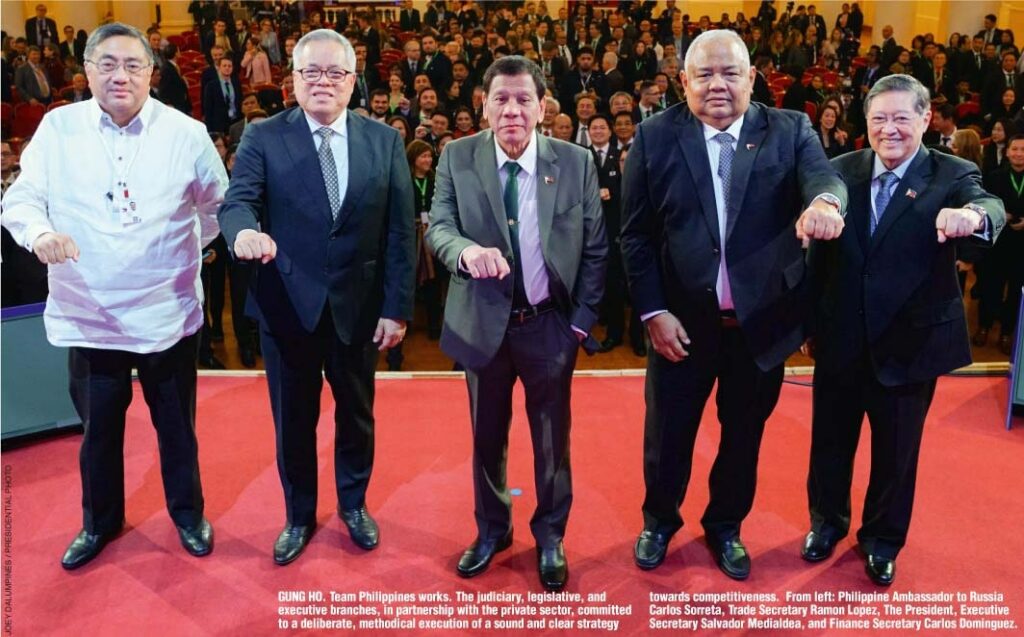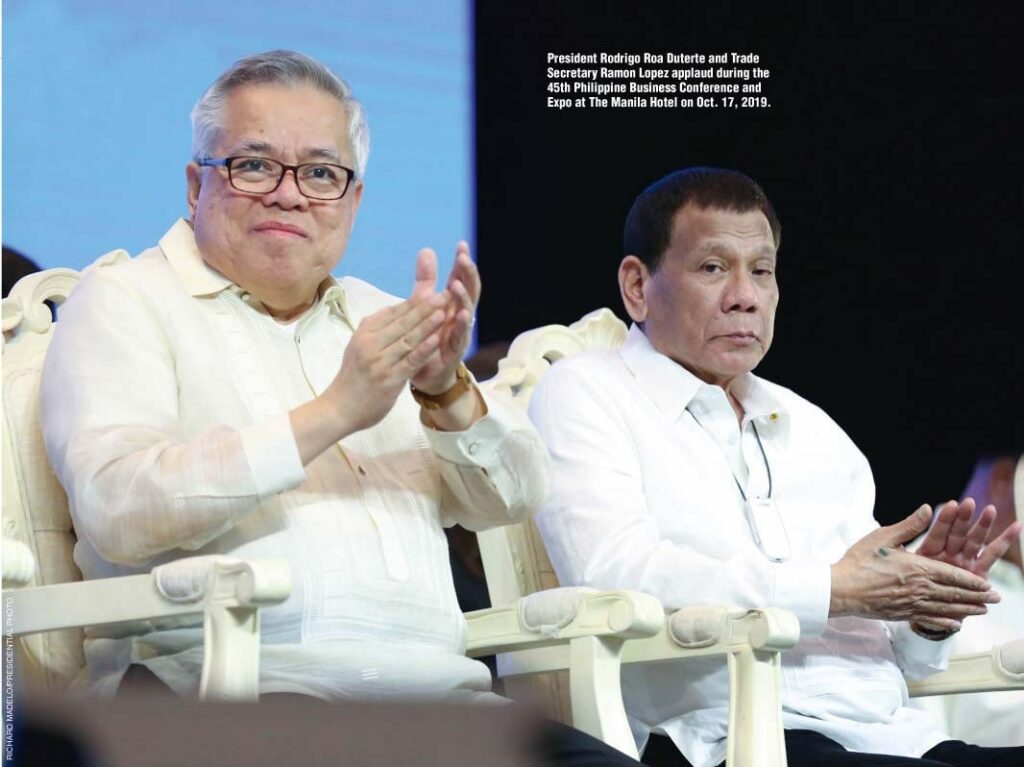
By Secretary Ramon M. Lopez – Department of Trade and Industry
I have good news for you today.
The World Bank has just released its Doing Business 2020 Report which shows our country’s remarkable improvement relative to ease of doing business (EODB).
The Philippines’ EODB score increased from 57.68 to 62.8 (+5.12) this year, which translates to a sharp improvement in our rank from 124th to 95th place among 190 economies. This is a “long jump” of 29 notches.

Facts behind the jump
Our double-digit improvement is even made more significant given the following facts:
- The Philippines was cited by the World Bank as one of 42 economies which implemented regulatory reforms (in more than three topics) which resulted in significant improvements in EODB scores.
- The Philippines is one of the Top Three high jumpers among the 190 economies covered by the WB study. In terms of rank, the Philippines is the 3rd highest, next only to Togo (+40), and Saudi Arabia (+30), as we share the same spot with Jordan which also increased by +29 notches.
- Among ASEAN, the Philippines’ recorded the highest improvement, both in rank and EODB score, followed by Myanmar which rose from 171st to 165th (+6 notches), and its EODB score from 44.72 to 46.8 (+2.08)
- The last time the Philippines ranked 95th — the highest spot we held, so far—-was in the year 2014. This DB 2020 cycle increase remains the highest recorded (annual) improvement of the country since 2010.
Go team Philippines
In pursuing ease of doing business, DTI adopted a formula of [whole of government approach + public-private sector partnership] which we now see is a winning formula.
Team Philippines works. The judiciary, legislative, and executive branches, in partnership with the private sector, committed to a deliberate, methodical execution of a sound and clear strategy towards competitiveness.
Today, we see the fruits of our labor. May I take this opportunity to recognize our partners from both government and the business community who made the +29 notches possible.
Congratulations for your dedication, patriotism, and hard work. In particular:
- Starting a business – SEC, BIR (DOF), LGU-QC, Pag-IBIG, PhilHealth, SSS
- Dealing with construction permits – LGU-QC
- Getting electricity – MERALCO
- Registering property – LRA, LGU-QC
- Getting credit – CIC, and private sector organizations like TransUnion, BAP Credit Inc., CRIF, Compuscan
- Protecting minority investors – SEC
- Paying taxes-BIR, SSS, PhilHealth and Pag-IBIG
- Trading across borders – BOC (DOF)
- Enforcing contracts – SEC, Supreme Court
- Resolving insolvency – Supreme Court
- Logistics services sector
The road to 95 was challenging much like climbing Mount Everest. We worked fast, and scaled up our reform initiatives. For the DB 2020 cycle, team Philippines submitted 53 reforms/data correction requests to the World Bank. All 11 data correction requests were considered but only 9/42 reforms were accepted.
Today is a time for thanks. For recognition. For Celebration.
Reporting the results
The Philippines performed best in three topics: Getting Credit (from EODB score of 5.0 to 40.00); Protecting Minority Investors (from EODB score 43.33 to 60.00) and Dealing with Construction permits (from 68.58 to 70.00)
[In terms of rank: Getting Credit (from 184th to 132nd); Protecting Minority Investors (from 132nd to 72nd); and Dealing with Construction Permits (from 94th to 85th)]
We also registered higher scores in Paying Taxes (72.6 from 71.8), and slightly higher scores on Enforcing contracts (46 from 45.96) and Registering property (57.6 from 57.56), but still our ranking declined because other countries moved faster in these areas.
Paying taxes
On paying taxes – the WB recognized the efforts of the LGU-QC, as verified with the respondents that payments for local business tax and community tax are paid together.
Also, the BIR, which under the TRAIN law simplified the income tax returns for corporations which reduced the number of hours in the preparation and filing of corporate income tax from 38 to 24 hours.
On enforcing contracts, we thank the Supreme Court, particularly the Office of the Court Administrator Midas Marquez, for the effort — and the speed of action — on the reforms to reduce the time and cost of resolving a standardized commercial dispute. Immediately, the Supreme Court increased the threshold for small claims cases filed before the Metropolitan Trial Courts from P300,000 to P400,000.
The WB team acknowledged this reform however, there was not enough time to assess impact of the Revised Rules of Procedure for Small Claims Cases on the standardized commercial dispute. This, we believe will have an impact in the next cycle of the DB 2021, together with the Court’s E-library.
Registering property
On registering property, private sector experts confirmed that, as of May 1, 2019, the Land Registration Authority (LRA), Register of Deeds, had implemented a comprehensive and functional database to check for encumbrances.
The electronic database was implemented following LRA’s initiative to digitize all land titles.
When a background check of a property is required, LRA can now use the property number to search the title and obtain information of all encumbrances, caveats, charges or privileges affecting the registered property.
As per the Registering Property indicator methodology, a score of one point is given to an economy where the agency in charge of registering immovable property has implemented a comprehensive and functional database to check for encumbrances, covering most of the properties registered in the largest business city of this economy.
This database should include information on all encumbrances, caveats, charges or privileges affecting a registered property.
Our data challenge
Same time last year, the DOF and DTI Secretaries jointly issued a statement where we posed a data challenge. We expressed, our country’s strong objections on the drastic slide in the 2019 DB report which show a drop in the ranking by 11 notches from 113 (2018) to 124 (2019).
This was attributed mainly to the country’s dismal performance in the “Getting Credit” indicator.
We said that the World Bank has gotten that one wrong. This was regrettable considering the significant headway made by the Philippines on the other indicators.
While no mention of this data challenge was made in the DB 2020 report, we are “relieved” that a more realistic assessment of the Philippines’ credit Information ecosystem has been reflected in the World Bank report.
We thank all the credit bureaus who met with the World Bank team early this year, to validate the data submitted by government. Because of your support, the Philippines’ rank in Getting Credit rose from 184/190 countries to 132/190—increasing by 52 notches.
Let me assure you that the ARTA/DOF-SEC/DTI team are all behind you in your quest to promote financial inclusion. We recognize the need to continue the work.
We have to:
— Expand the coverage of distributed credit information of Transunion to firms not only individuals
— Pursue Data exchange between credit bureaus and SSS, GSIS, and utility companies and retailers
— Fully utilize the credit Information system
But addressing the Depth of Credit Information Index is only half the story.
The Anti-Red Tape Authority (ARTA), now needs to ensure the Strength of Legal Rights Index and work with DOF for the immediate issuance of the Implementing Rules and Regulations for the Personal Property Security Act of 2018, and for the Land Registration authority to embark on a collateral registry
The role of Congress
Special thanks are in order to our senators and congressmen for enacting laws which contributed to our achievement today.
The Revised Corporation Code removed the minimum paid in capital, and allowed the SEC to issue regulations on related party transactions.
The World Bank recognized the Philippines’ efforts to strengthen minority investor protection by requiring greater disclosure of transaction with interested parties and enhancing director liability for transactions with interested parties.
With the enactment of the Revised Corporation Code in February 2019, the Securities and Exchange Commission issued Memorandum Circulars on Related Party Transactions which dramatically increased the EODB scores on the topic from 43.33 to 60.00, and more significantly raised sharply the Philippine rank from 132nd to 72nd.
Much like a climb to Mount Everest, we need to prepare for the next base camp. The target in the PDP for 2020 is top 40%, which would be around rank 76.
We need to unite and be prepared to Institute “game-changers” that will enable enterprises to become more competitive and the country more attractive to investors, whether local and foreign.
We need to implement bolder and smarter reforms that will reflect a future-ready Philippines.
Points to consider
The DB 2020 study mentioned interesting points that we can consider:
Economies that score highest on the ease of doing business share several common features including the widespread use of electronic systems.
All of the 20 top-ranking economies have online business incorporation processes, have electronic tax filing platforms, and allow online procedures related to party transfers.
Moreover, 11 economies have electronic procedures for construction permitting.
Fourteen of the 20 top performance have a unified collateral registry.
Priorities
As the ARTA prepares for DB 2021, we are looking at the following priorities:
i. Philippines Business Portal (i.e. Online, One form, One number, end-to-end mobile registration) — c/o DICT, ARTA, DOF, LGU QC and all agencies involved in business registration
ii. Online Corporate registration system- c/o SEC and DICT
iii. Unified Employee Reporting System for Social Security Agencies c/o DICT, SSS, PhilHealth, Pag-IBIG
iv. Property Registration Portal c/o DICT, LRA, BIR and other agencies involved in the property registration portal
v. Modern Collateral Registry (pursuant to Personal Property Security Act) c/o LRA
Mga kababayan,
We celebrate the fact that the Philippines is now one of the top 100 most competitive countries in the World—and we are on an upward trajectory.
We need to further speed up and scale up the reforms to remain in this path.
Let us be reminded that many of our reforms require gestation.
But we are confident that soon they will bear fruit. Automation, strict implementation of RA 11032, New regulations are underway.
While not all reforms were accepted by the WB in THIS cycle, we are counting on the newly established Anti Red Tape Authority (ARTA) to ensure that the agencies continue the DB reforms already initiated.
These reforms must create a positive impact on our stakeholders. We know That we are measured not by what we do, or what we have accomplished, but whether the reforms created a positive experience for our citizens.
Today, we must celebrate this win.
Tomorrow, we continue the work we started, with speed, and with scale.
Maraming salamat po!
EASY FOR BUSINESS
You can say it is much easier now to do business in the Philippines, under the administration of President Rodrigo Roa Duterte.
The Philippines now ranks 95th in ease of doing business, per a World Bank report. That’s among 190 countries. But 95th came from 124th.
The jump is 29 rungs—phenomenal by Philippine standards where doing things in some government offices is measured in millennia. Things never really move nor improve.

In Southeast Asia, the Philippines has among the worst records in making things easy for businessmen and investors.
In the entire world, Singapore is second best, Malaysia 12th, Thailand 21st, and Vietnam 70th. They are our ASEAN neighbors. We are 95th. And we say wow.
Three areas improved
The Philippines improved in three areas: starting a business, dealing with construction permits and protecting minority investors.
A combination of legal and administrative reforms have made the historic improvements for the Philippines possible.
First is Duterte himself. He has fear and wow factor. Bureaucrats fear him because he could shame them—or even kill them. So the public is in awe. A no-bullshit President. There never was one before him.
Then, a law was passed to cut red tape in the entire government bureaucracy. A commission was formed to enforce the law. The commission’s establishment was delayed, of course,—by red tape.
When the Anti-Red Tape Authority (ARTA) was finally set up, nine months behind deadline, it still had to feel its way thru the labyrinth of bureaucracy.
At the administrative level, the most red tape- and corrupt-ridden government agencies finally got together (perhaps out of fear of the President) and thought of somehow, simplifying their cumbersome procedures. It is not only out of sense of duty that they got together. Duterte ordered an across-the-board cut in red tape— a procedure must take at most three days, in all government agencies.
Many of the agencies are headed by people who think they are lords to whom the public must pay homage before they are rendered public service. Other “public servants” are just plain sadists who think it is cool to make the public fry under the sun or to cool heels for endless hours.
Complying with that order was not easy. “It was like climbing Mount Everest,” grins Trade and Industry Secretary Ramon Lopez.
What are these agencies? Here they are:
• Starting a business – Securities and Exchange Commission (SEC), EC, Bureau of Internal Revenue, Pag-IBIG, PhilHealth, Social Security System, and various local government units (LGUs or the towns and cities). In the World Bank study, the sample LGU is Quezon City.
• Dealing with construction permits – LGU
• Getting electricity – MERALCO
• Registering property – Land Registration Authority (LRA) , LGU
• Getting credit – Credit Information Corporation (CIC), and private sector organizations like TransUnion, BAP Credit Inc., CRIF, Compuscan
• Protecting minority investors – SEC
• Paying taxes– BIR, SSS, PhilHealth and Pag-IBIG
• Trading across borders – Bureau of Customs
• Enforcing contracts – SEC, Supreme Court
• Resolving insolvency – Supreme Court
• Logistics services sector
Thanks to Ramon Lopez, here is the present system and how it has improved (Note: This is on paper; it does not mean it is the actual practice).
Many times the concerned government agency has some additional excuses to add an extra step, an extra day, or an extra cost (until the applicant gets the message, you know). This is particularly true of the SSS where things do not seem to improve, at all.
To register a company, it now takes only three steps (from four) and three days (from five).
To deal with the BIR in Quezon City, it takes two steps (from six before) and eight days (from 12 before). Still, can you imagine dealing with the taxman for eight days? In number of working days, that’s a week and a half.
In starting a business in Quezon City, it now takes 10 steps and 16 days. It used to be 16 steps and 28 days. The best global standard in starting a business – 10 minutes, one step.
Making things easy for business is good for business, good for the economy, and good for the country.
Says the World Bank, in its 2020 Ease of Doing Business Report: “Economies that score well on Doing Business indicators benefit from a higher level of entrepreneurial activity. This in turn generates better employment, greater government revenue and higher incomes. In addition, where burdensome and protracted regulatory processes exist, the temptation to resort to corruption to get things done may be greater.”
The World Bank says that in almost every country, “there is some scope to streamline or expedite rules to make it easier to do business, allow entrepreneurship to flourish, and make it possible for economic activity to reach its full potential.”
Five East Asia and the Pacific economies are among the top 25 global performers, including Singapore(2nd), Hong Kong SAR, China (3rd); Malaysia (12th); Taiwan, China (15th); and Thailand (21st).
China jumped in the ranking to 31st and is among the top 10 improvers for the second consecutive year.
